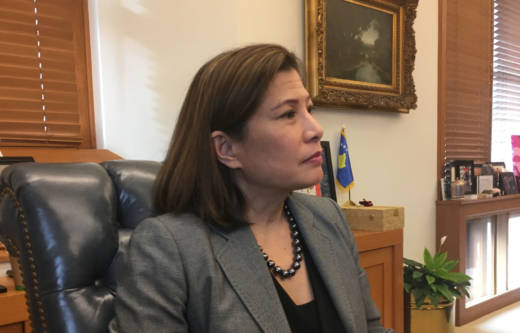California Chief Justice Tani Cantil-Sakauye is standing by her criticism of federal immigration enforcement in state courthouses after a strong rebuke from the U.S. attorney general and secretary of Homeland Security.
The two Trump cabinet members took issue with Cantil-Sakauye's characterization in her March 16 letter that "immigration agents appear to be stalking undocumented immigrants in our courthouses to make arrests" and implied that courthouse arrests may not be necessary if not for state and local laws in some areas that inhibit police and sheriff cooperation with federal immigration enforcement.
Those laws are generally known by the name "sanctuary policies," although there is no formal definition and so-called "sanctuary cities" vary widely in their policies and levels of cooperation with immigration authorities. Stripping federal funding from such cities, including San Francisco, Oakland and Los Angeles, has been a priority of the Trump administration.
From Attorney General Jeff Sessions and Homeland Security Secretary John Kelly's response made public Friday:
As the chief judicial officer of the State of California, your characterization of federal law enforcement officers is particularly troubling. As you are aware, stalking has a specific legal meaning in American law, which describes criminal activity involving repetitive following or harassment of the victim with the intent to produce fear of harm.
...
Some jurisdictions, including the State of California and many of its largest counties and cities, have enacted statues and ordinances designed to specifically prohibit or hinder ICE from enforcing immigration law by prohibiting communication with ICE, and denying requests by ICE officers and agents to enter prisons and jails to make arrests. Such policies threaten public safety, rather than enhance it. As a result, ICE officers and agents are required to locate and arrest these aliens in public places, rather than in secure jail facilities where the risk of injury to the public, the alien, and the officer is significantly increased because the alien can more readily access a weapon, resist arrest, or flee. Because courthouse visitors are typically screened upon entry to search for weapons and other contraband, the safety risks for arresting officers and persons being arrests are substantially decreased.
...
Therefore, we would encourage you to express your concerns to the Governor of California and local officials who have enacted policies that occasionally necessitate ICE officers and agents to make arrests at courthouses and other public places.
Cantil-Sakauye doubled down on her previous comments in a written statement, arguing that immigration arrests inside courthouses will discourage victims and witnesses from coming to court.

